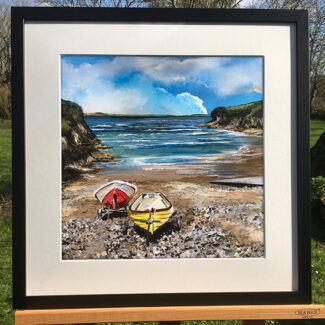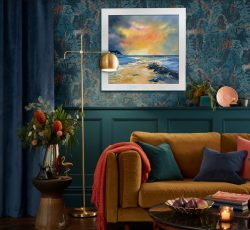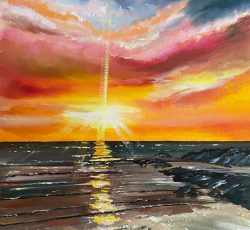Painting with acrylics in Pembrokeshire is available at ‘Art your Way’ courses held at the Havens Art School in Pembrokeshire. Well-known artist, Jill jones, runs classes on a regular basis in her custom-built studio/gallery. You’ll find her studio a little way south of Little Haven, in the hamlet of Talbenny. The classes are very popular and have received excellent testimonials and referrals.
The classes are half-day or full-day and are held in a very friendly atmosphere, all including refreshments with lunch provided on the day-long classes. From Little Haven, head in the direction of Dale and in just over a mile you will see the sign for ‘Havens Art School’ on the left hand side of the road. And, if you want to practice acrylic painting in Pembrokeshire this is the place to start!

What is acrylic paint
Acrylic paint is paint made of pigment suspended in acrylic emulsion. It is water-soluble and fast-drying and becomes water-resistant once dry. You will find it extremely versatile and when diluted or modified a painting can resemble a watercolour or an oil painting . It can also have its own unique characteristics not attainable with other media.
You will find that the range of acrylic mediums is greater than watercolour and oil. In addition, acrylics have the ability to bond to many different surfaces. For example, you can use acrylics on paper, canvas and a range of other materials.
Pros and Cons of painting with acrylics
The Pros:
- It’s versatile. You can paint on any surface that is oil and wax free. Indeed, this includes canvas, wood, paper, rocks, glass, fabric, cardboard, metal, and plastic. Furthermore, with the proper preparation you can use acrylic paint on almost everything.
- It dries quickly and this allows you to finish your project faster.
- It’s water-soluble. You can wash it off your hands and brushes (while they’re still wet) with soap and water with no need for paint thinners.
- It’s less toxic and safer around children and pets.
- It’s more affordable.
- It’s flexible. You can mix acrylics with lots of different mediums to get different textures, adhering features, or to change the drying time.
- It’s durable. As far as we know, acrylics are flexible and won’t crack, peel, or turn yellow.
- It’s vibrant.
- It’s water-resistant when dry.
The Cons:
- Its colour becomes darker when dry, so the colour you paint with isn’t necessarily what you’ll end up with.
- It’s fast-drying, meaning you need to work quickly.
- It’s hard to remove from brushes, nails or clothing once dried. It’s best to keep a container of water near you while you’re painting to keep the brushes wet so they are easy to clean. You should also wear protective clothing.
- It’s considered by some art galleries and collectors as ‘not as valuable’ when compared with other paint mediums.
Booking a class
If you would like to explore painting with acrylics in Pembrokeshire, it’s easy to book a class:
- Simply call Jill on 01437 781386
- Or email her on art@jilljones.co.uk
- Or you can message her on her Facebook page: Pembrokeshire Art Classes



